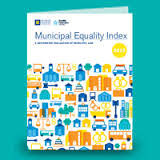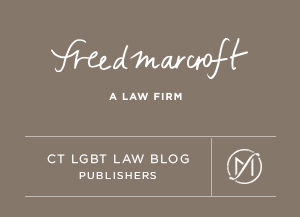Hartford and New Haven Score at the Top of 2013 Human Rights Campaign LGBT Municipal Equality Index
 The Human Rights Campaign and Equality Federation have released their second annual national Municipal Equality Index, an evaluation of a “city’s laws and policies and an examination of how inclusive city services are of LGBT people.”
The Human Rights Campaign and Equality Federation have released their second annual national Municipal Equality Index, an evaluation of a “city’s laws and policies and an examination of how inclusive city services are of LGBT people.”
Cities are rated on a scale of 0-100, based on the city’s laws, policies, benefits, and services. There are 100 available standard points and 20 available bonus points (bonus points are awarded for programming or actions that apply to some but not all cities).
Why a city by city analysis? As HRC Foundation President Chad Griffin wrote in his introduction to 2012’s inaugural MEI:
As we make progress towards full equality at the state and federal levels, it is crucial to recognize the progress at the local level as well. In fact, we’ve found that’s often where progress begins. Some of our community’s earliest victories took place in cities and municipalities. Even more, we’ve found that these local results have a tendency to “bubble up” to the state level and business world. Often municipalities will move first, passing nondiscrimination ordinances that later serve as important models when inclusive statewide laws or corporate policies are under consideration.
This year four Connecticut cities were scored: Hartford, New Haven, Bridgeport, and Storrs.
Hartford received a 99, up from last year’s 95. Its raw score was 92, with 7 bonus points.
The awarded bonus points highlight some noteworthy items. Hartford was given bonus points for the City’s domestic partner registry that predated statewide marriage equality, its status as a “welcoming place to work,” and the city services provided to “particularly vulnerable populations of the LGBT community.” Hartford’s final bonus points were awarded for its “openly LGBT elected or appointed municipal leaders,” most notably, of course, openly gay Mayor Pedro Segarra. (Mayor Segarra is only the second openly gay mayor of a U.S. state capital.)
Given its excellent score it is hard to say that Hartford fell short, but if you look at where the City missed picking up those 8 standard points, they were in all in the study’s law enforcement category. With respect to law enforcement, the MEI indicates that “fair enforcement of the law includes responsible reporting of hate crimes and engaging with the LGBT community in a thoughtful and respectful way.” Out of a total 18 standard points available in the law enforcement category, the MEI awarded Hartford all 10 available points for reporting hate crime statistics to the FBI, and none of the available 8 points because the City does not have a “LGBT Police Liaison or Task Force.” Theoretically related to the absence of a LGBT Police Liaison or Task Force, the City also missed a few available bonus points because, according to the MEI, it does not “engage with the LGBT community.” (That said, Hartford did earn 5 standard points for having an LGBT liaison in the Mayor’s office.)
New Haven received a perfect score of 100, and was awarded all of the MEI’s 100 available standard points. It also received 5 bonus points, but scores cannot exceed 100. New Haven’s bonus points were related to the City’s “openly LGBT elected or appointed municipal leaders,” and the city services provided to “particularly vulnerable populations of the LGBT community.” As with Bridgeport and Storrs, this was the first year New Haven was included in the MEI.
Bridgeport struggled and scored a 61. Although it received perfect scores in the “Non-Discrimination Laws” and “Relationship Recognition” categories, the City’s weakest category was “Municipality as Employer,” in which Bridgeport scored a 6 out out of an available 26 points. This category of the MEI is intended to be reflective of the municipality’s “commitment themselves to treating LGBT employees equally” as evidenced by its ” offering equivalent benefits and protections to LGBT employees, and by awarding contracts to fair-minded businesses.” Bridgeport also fell short in the “Relationship with the LGBT Community” category, scoring 2 out of 8 available points, and, like Hartford, was dinged for the absence of a LGBT Police Liaison or Task Force.
Unfortunately Storrs — included in the list for the first time this year because it is “home to the state’s largest public university” -— underperformed, scoring a 58. Like Bridgeport, it received perfect scores in the “Non-Discrimination Laws” and “Relationship Recognition” categories. Storrs had difficulty in the “Municipality as Employer,” “Municipal Services,” “Law Enforcement,” and “Relationship with the LGBT Community” categories, scoring 5 out of 26, 13 out of 18, 10 out of 18, and 0 out of 8 available points, respectively.

